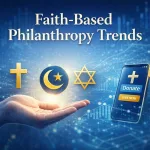
Faith and mental health: what research actually says (and what it doesn’t)
Many wonder how faith molds our minds and emotions, revealing surprising psychological effects that influence resilience and well-being in unexpected ways.
Faith in different cultures is both universal and deeply personal, forming a powerful thread that connects people across continents, eras, and belief systems. For thousands of years, faith has helped communities explain the unknown, endure hardships, and find meaning in life’s mysteries. While many associate faith with organized religion, its expression is much broader. Faith can mean belief in divine beings, adherence to moral values, loyalty to tradition, or even confidence in humanity’s potential to create a better world.

Understanding faith in different cultures is essential for anyone who wants to appreciate global diversity, engage in meaningful dialogue, or develop a more compassionate worldview. When we examine how various societies understand faith, we open the door to empathy, respect, and a richer understanding of what motivates people spiritually and emotionally.
To explore faith across cultures, it helps to start with a broad definition. At its core, faith is a deep trust or confidence in someone or something, even without physical proof. This trust can take many shapes:
What makes faith so fascinating is that while this general definition applies globally, its expression differs dramatically depending on culture, history, geography, and worldview. No two societies understand or practice faith in exactly the same way.
In much of the Western world, shaped heavily by Christianity, Judaism, and to some extent Islam, faith is often associated with belief in a personal God and adherence to sacred teachings.
1. Trust in a Divine Being
Western faith typically includes belief in God’s existence, goodness, and involvement in human life. This trust forms the foundation of prayer, worship, and spiritual devotion.
2. Salvation and Redemption
In Christianity especially, faith is closely linked to salvation—the belief that trusting in God leads to eternal life or spiritual liberation.
3. Moral and Ethical Guidance
Religious scriptures like the Bible or Torah offer principles for ethical living. Faith guides behavior, relationships, and decisions.
4. Importance of Community
Churches, synagogues, and religious gatherings create shared spaces where faith is practiced collectively. Community reinforces belief through worship, rituals, and support networks.
In Western contexts, faith blends personal devotion with communal practice, making it both an individual experience and a social identity.
Eastern traditions, including Buddhism, Hinduism, Taoism, and Confucianism, offer a distinct understanding of faith. Rather than focusing on belief in a single deity, Eastern faith often emphasizes inner transformation, harmony, and experiential understanding.
In Buddhism, shraddha refers to confidence in the Buddha’s teachings and the potential for enlightenment.
Faith is not blind belief, it is trust gained through personal experience, meditation, and inner realization.
Hindu traditions express faith through bhakti (devotion), belief in karma and reincarnation, and reverence for sacred texts.
Faith here is diverse, allowing people to connect with the divine through different deities and philosophical paths.
Taoism teaches faith in the Tao, the natural, effortless order of the universe.
Instead of worshiping a personal god, followers cultivate harmony, balance, and acceptance of life’s rhythm.
Although not a religion, Confucianism emphasizes faith in human goodness.
Its teachings focus on respect, responsibility, and ethical behavior, reflecting faith in moral virtue and proper relationships.
Across Eastern cultures, faith is less about doctrinal belief and more about living in alignment with universal truths, inner peace, and ethical balance.
Indigenous cultures around the world have some of the most ancient and holistic expressions of faith. For many tribal communities, spirituality is not a separate part of life, it is life itself.
1. A Holistic Worldview
Faith integrates nature, ancestors, community, and daily activities. There is no strict separation between the physical and spiritual worlds.
2. Animism and Sacred Nature
Many indigenous traditions believe all things—trees, rivers, animals, mountains—carry spiritual essence or life force.
3. Ancestor Reverence
Faith includes deep trust in the guidance of ancestors, who are believed to protect, teach, and influence the living.
4. Ritual and Storytelling
Ceremonies, dances, chants, and oral stories pass down wisdom and preserve cultural identity. These practices express faith with beauty, community, and continuity.
Indigenous faith is grounded in place, memory, and the interconnectedness of all living beings.
Faith in different cultures is not always religious. In modern society, many people express non-theistic faith, grounded in humanity, logic, and shared values.
This shows that faith does not require religion, it can also be rooted in optimism, collective responsibility, and human resilience.
Exploring faith in different cultures does more than satisfy curiosity, it strengthens our ability to connect with others.
Understanding how different societies view faith helps us communicate respectfully and reduces misunderstandings.
When we see how deeply meaningful faith is across cultures, we learn to value beliefs different from our own.
Comparing perspectives often deepens our own spiritual understanding, challenges assumptions, and broadens our worldview.
Recognizing the beauty of diverse faith traditions fosters unity and compassion in an increasingly interconnected world.
From Western devotion to a personal God, to Eastern trust in universal truths, to indigenous reverence for nature and ancestors, faith in different cultures demonstrates humanity’s endless creativity in seeking meaning. Whether expressed through ritual, meditation, ethical behavior, community solidarity, or trust in human potential, faith continues to inspire courage, shape values, and guide countless lives.
By exploring faith in different cultures, we gain not only knowledge but also wisdom—the kind that deepens understanding, strengthens compassion, and reminds us of our shared humanity.

Many wonder how faith molds our minds and emotions, revealing surprising psychological effects that influence resilience and well-being in unexpected ways.

Faith-based philanthropy trends reveal a reality that is often misunderstood: charitable giving rooted in faith has never been static. From the earliest forms of communal offerings in ancient civilizations to structured religious obligations such as tithing, zakat, and tzedakah, faith-based generosity has continuously evolved alongside social, economic, and technological transformations. Introduction: Faith at the Crossroads […]

A deep exploration of how faith shapes moral choices reveals complexities that challenge simple answers and invite thoughtful reflection.

Understanding faith across religions reveals shared truths and unique beliefs—unlocking mysteries that connect humanity in unexpected ways. Discover more inside.

Strengthening bonds and shaping values, faith plays a crucial role in communities—discover how it influences unity and resilience in unexpected ways.

Struggling between conviction and uncertainty, faith and doubt intertwine in ways that challenge beliefs and reveal unexpected spiritual depths. Discover the paradox within.